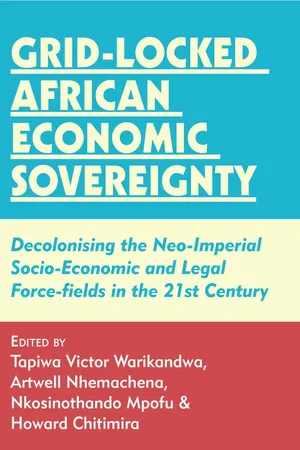
Grid-locked African Economic Sovereignty
Decolonising the Neo-Imperial Socio-Economic and Legal Force-fields in the 21st Century
- 654 pages
- English
- PDF
- Available on iOS & Android
Grid-locked African Economic Sovereignty
Decolonising the Neo-Imperial Socio-Economic and Legal Force-fields in the 21st Century
About This Book
The emergent so-called Fourth Industrial Revolution is regarded by some as a panacea for bringing about development to Africans. This book dismisses this flawed reasoning. Surfacing how investors are actually looting and plundering Africa; how the industrial internet of things, the gig economies, digital economies and cryptocurrencies breach African political and economic sovereignty, the book pioneers what can be called anticipatory economics which anticipate the future of economies. It is argued that the future of Africans does not necessarily require degrowth, postgrowth, postdevelopment, postcapitalism or sharing/solidarity economies: it requires attention to age-old questions about African ownership and control of their resources. Investors have to invest in ensuring that Africans own and control their resources. Further, it is pointed out that the historical imperial structural creation of forced labour is increasingly morphing into what we call the structural creation of forced leisure which is no less lethal for Africans. Because both the structural creation of forced labour and the structural creation of forced leisure are undergirded by transnational neo-imperial plunder, theft, robbery, looting and dispossession of Africans, this book goes beyond the simplistic arguments that Euro-America developed due to the industrial revolutions.
Frequently asked questions
Information
Table of contents
- Cover
- Title page
- Copyright page
- About the Authors
- Contents
- Foreword
- Chapter One - Explosive Economic Minefields in Invisible Neo-Imperial Force-fields: An Introduction to Decolonising Economies in Africa
- Chapter Two - Anticipating African Economic Futures – Or Is It Time to Look in the Rear View Mirrors? Land Restitution, Unemployment and the Figure of the Posthuman
- Chapter Three - Re-Africanisation of Economies through Ubuntu? Business and Kinship Obligations in Urban South Africa
- Chapter Four - The Land as Economy and Economy as Land: Towards a Reappraisal of the Political Economy of Land Repossession in Contemporary South Africa
- Chapter Five - Displacements in Colonial Zimbabwe: Contestations, Meanings, Consequences and Some Lessons
- Chapter Six - Agriculture and Africa’s Development Agenda
- Chapter Seven - Growth Orientated African-centred Agriculture, Cooperatives and Policy Reforms: Towards Poverty Alleviation and Food Security
- Chapter Eight - Oil Discovery and Large Scale Land Acquisitions in Uganda: An Examination of the Implications for Livelihoods in Selected Oil Village Communities
- Chapter Nine - Dispossessed and Marginalised Majorities: The Crises of (Neo-)colonial Theft and Economic Exclusion in Africa South of the Sahara
- Chapter Ten - “Investors” or Looters? A Critical Examination of Mining and Development in Africa
- Chapter Eleven - Chinese Companies and their “Investments” in Africa: A Critique of the Viability of China’s Corporate Social Responsibility Approach in Zimbabwe’s Mining Sector
- Chapter Twelve - Multinational Pharmaceutical Companies (MPCs) and Mal-Drug Administration: Any Role for State Government in the Era of Globalisation in Africa?
- Chapter Thirteen - Reasserting the Rightful Place of African Languages in Sustainable Development
- Chapter Fourteen - Towards the Establishment of Robust Financial Market Laws? An appraisal of the Decolonisation of “Investments” in Zimbabwe
- Chapter Fifteen - Decolonising Investment Regimes for Development Purposes in Contemporary Africa
- Chapter Sixteen - Mukapuli and Another v Swabou Investments (Pty) Ltd SA 49/2011 2017 NASC (23 Jun 2017): The Namibian Experience on Assumed Consumer Sovereignty in Credit Contracts
- Chapter Seventeen - International Trade Agreements and the Trade-Labour Linkage Debate: A Southern African Perspective – Part 1
- Chapter Eighteen - Promoting Economic Transformation and Empowerment and “Investment Security” in Namibia: An Appraisal of the National Equitable Economic Empowerment Framework Bill
- Chapter Nineteen - International Trade Agreements and the Trade-Labour Linkage Debate: A Southern African Perspective – Part 2
- Chapter Twenty - The Ethic of Ubuntu and Recent Development in the South African Banking Law
- Chapter Twenty One - Decolonisation and the Constitutional Right to Fair Labour Practices: A Contemporary South African Perspective
- Back cover